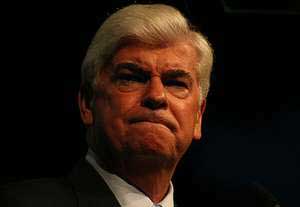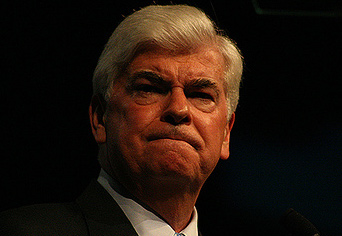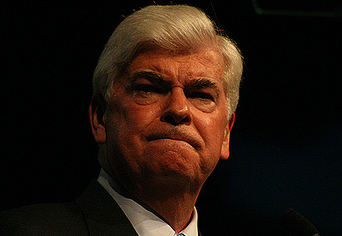
Photo courtesy of flickr user Randy Bayne.
When Chris Dodd’s first quarter campaign disclosures were released this spring, revealing that just five of the hundreds of donors to the veteran senator’s reelection bid were residents of his homestate of Connecticut, the political attack ads basically made themselves. One, released by one his Republican challengers, features a map showing the home states of his out-of-town contributors and the amounts derived from each locale: $90,000 from Massachusetts, $100,000 from Maryland and New York, $81,000 from Texas. And then, as game show style music plays, the zinger: just $4,250 from residents of the Nutmeg State.
Here at Mother Jones, Jonathan Stein and I focused on another aspect of Dodd’s first quarter disclosures: the fact that, with his political future in jeopardy, the five-term senator and chair of the powerful Senate banking committee appeared to be receiving a personal bailout from his friends in the finance industry.
Despite his waning appeal in Connecticut, Dodd’s fundraising effort picked up steam in the first three months of 2009. He raised just more than $1 million during the quarter, according to federal campaign disclosure records. Almost a third of that money—at least $299,000—came from banking and investment executives, financial industry trade groups, and finance-oriented political action committees (PACs). An additional $68,000 came from lobbyists, many with clients on Wall Street. And that doesn’t count the formidable financial support Dodd has received from insurance and health care interests.
Dodd’s spokesman, Bryan DeAngelis, insisted at the time: “Campaign contributions do not and never have influenced Senator Dodd’s agenda and priorities. As his record reflects—from working to stop abusive credit card practices and predatory lending to opposing industry-friendly bankruptcy reform and tax breaks for companies that ship jobs overseas—Chris Dodd’s priorities are not determined by the financial industry. His work is always and has always been about representing the interest of the people of Connecticut.” Well, there are at least five Connecticut residents who think so.
It’s certainly true that Dodd has been a standout consumer advocate in the Senate. Recently, he shepherded credit card reform legislation that reined in some of the industry’s more abusive practices. But he hasn’t been able to escape the perception that he’s way too cozy with K Street and the industries he oversees and out of touch with his own constituents. Not that Dodd has done much to dispel that image. Until now, that is. According to Roll Call, Dodd “has tried to distance himself from K Street by taking an increasingly pro-consumer, anti-industry tack.” This shift understandably has K Streeters and finance industry execs worried and, yes, a bit angry too. After all, they’ve been quite generous to his campaigns, including his failed presidential run, and they expect something in return. This isn’t charity after all.
“He is taking positions to prove that he’s not bought and paid for, almost to prove to voters in Connecticut that he has not lost his way,” one finance industry lobbyist told the paper. “If he’d won his election and he was looking at these issues with a full six-year term in front of him, he’d be taking different positions. It’s a scary thing for lobbyists and for the industry in general.”
Dodd may be banking on the fact that he can have it both ways. He can rehab his too-close-to-K-Street image, while continuing to pull in industry campaign cash to give him a fighting chance in what’s projected to be a very tight 2010 election. As another lobbyist pointed out to Roll Call, Dodd can snub K Street and Wall Street and still “raise money from the traditional donors because he’s chairman of the Banking Committee.”
The real question for Dodd is, if he prevails in 2010, is it just back to business as usual?















